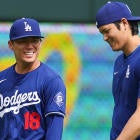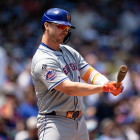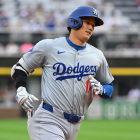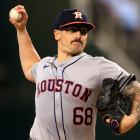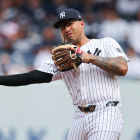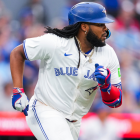 As already noted in this space, Nationals rookie outfielder Bryce Harper is going to be an All-Star. His selection, which came about because Marlins slugger Giancarlo Stanton was forced to undergo knee surgery, makes him the youngest All-Star position player ever.
As already noted in this space, Nationals rookie outfielder Bryce Harper is going to be an All-Star. His selection, which came about because Marlins slugger Giancarlo Stanton was forced to undergo knee surgery, makes him the youngest All-Star position player ever.
As with anything having anything to do with Harper, this has people talking, and a great number of those people are talking about whether Harper deserves to be in Kansas City, among the baseball gods and the barbecue sandwiches. To answer this question, you must first acknowledge that the All-Star selection process is only partly about merit. MLB encourages fans to vote and vote often, and individual teams encourage fans to place tribal loyalties above all other factors. Who deserves to be there by any subjectively chosen objective measure is at best a lower-rung consideration. Who fans -- fans with the time and inclination to stretch the process to its allowable limits -- want to see is the real driver.
By that standard, then, Harper is a fine choice. There's no doubt that he's already a genuine phenomenon and an indelible part of the baseball narrative in 2012 (more than 4.5 million Google-search results and counting!). While some might point out that his failure to win the Final Vote is evidence that fans don't want to see Harper in the All-Star Game, I'd point out that the three players who finished ahead of Harper in the voting -- Chipper Jones, David Freese and Michael Bourn -- were added to the roster before he was. In that sense, you can make the case that when Stanton went down, Harper was the last "will of the people" choice left. So on the basis of popularity and fan appeal, it's hard to argue against Harper's making the roster, particularly since the process forced him to take the service entrance to get there.
But what about raw merit? To be sure, Harper's slash line of .283/.355/.475 is impressive enough, and once you account for the fact that he's just 19 years of age that level of production becomes historically astounding. But the All-Star Game, as MLB hastens to remind us, counts, and that means putting the best team on the field should be at least a secondary consideration.
Even by that standard, though, Harper is a perfectly reasonable choice among available outfielders. Jason Heyward of the Braves? Harper's park-adjusted OPS is higher. One can make the case that Heyward's advanced defensive numbers should give him the edge, but that presumes a level of accuracy in those numbers that may not be justified. Heyward, still just 22, is a future superstar in his own right, but he's roughly a wash with Harper in terms of 2012 production on a rate basis. You could go with Heyward over Harper simply because of the former's edge in playing time, but that requires quibbling at the margins.
Heyward's teammate, Martin Prado? His park-adjusted level of production is roughly equal to Harper's (and Heyward's), so there's little to distinguish him. Andre Ethier? He's on the disabled list. Dexter Fowler? The offense is worthy, but the fielding numbers -- again, to the extent that they can be trusted -- don't do Fowler any favors. Hunter Pence? His bat's been roughly equal to Harper's, but Harper's clearly better with the glove. Same goes for Jason Kubel.
All of this is to say, when you're pondering Harper's All-Star worthiness, you're really pondering two questions. Is he the guy fans want to see? The best evidence suggests he is. Is he the most deserving based on the numbers? Perhaps not, but he's in the discussion. Consider those two criteria and the shades of gray they entail, and Harper is a perfectly defensible choice.
So while we would never discourage righteous indignation on this, our Internet, perhaps other, more worthy sources of outrage can be found on this fine day.
For more baseball news, rumors and analysis, follow @EyeOnBaseball on Twitter, subscribe to the RSS feed and "like" us on Facebook.










